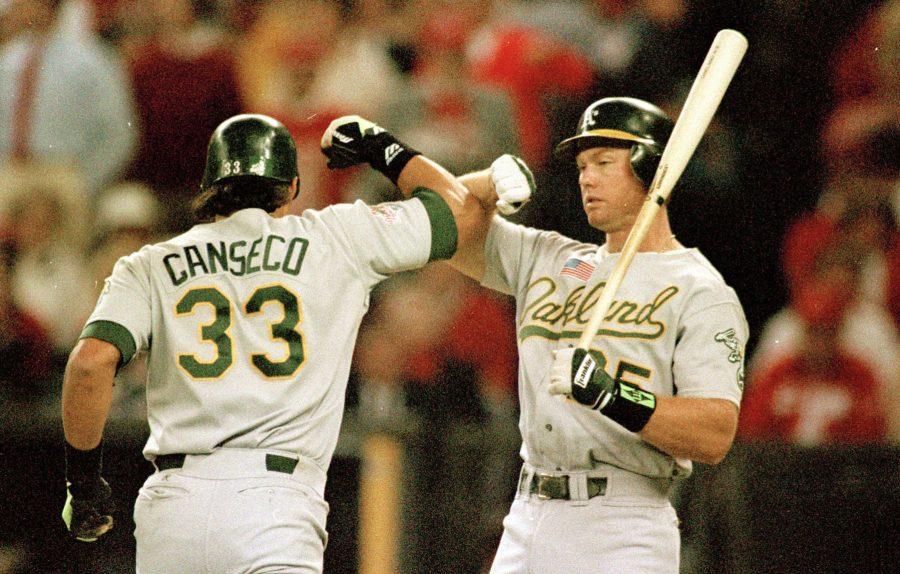PED use boosts careers, hurts legacies
Jose Canseco, left, and teammate Mark McGwire exchange their “Bash Brothers” salute after Canseco homered during Game 2 of the 1990 World Series against the Cincinnati Reds. (Jose Luis Villegas/San Jose Mercury News/TNS)
The use of performance-enhancing drugs dates back as far as sports themselves. There are many reasons why athletes find it more opportunistic to add body mass than others.
Performance-enhancing drugs (PEDs) are used to gain a competitive advantage over the opposition, which strikes many pundits as cheating or violating the integrity of the game. However, that has not stopped athletes from using steroids and enjoying the monetary benefits they can provide.
“It’s cheating,” said UNC Wilmington freshman Michael Smith. “It takes the spectacle out of sports.”
Baseball is the sport that gets the majority of press regarding PED use. After the 1994 baseball strike and subsequent decline in popularity, baseball was revived across America by the likes of Sammy Sosa, Mark McGwire, and Barry Bonds in large part due to the home run totals each produced.
From 1998 to 2011, those three players combined to have six seasons of hitting at least 64 home runs. The single-season home run record was broken twice over that span. Before that, it was broken twice over a 71-year period.
Over the same period, that trio combined to earned $118,701,904. Each increased their individual earning power prior to that offensive outburst. That number does not entail the different endorsement deals that come with the heightened level of fame and media attention.
Despite the historic numbers, steroids have generally been regarded as a stain on baseball because many feel PED users have cheated the game and records of past players. Despite numerous accolades and impressive career numbers, none of the aforementioned players have come close to being inducted into the Baseball Hall of Fame
“[Steroids] are unfair and a cheat to the game,” said UNCW pitcher Austin Warren.
It led to Major League Baseball and the MLB Player Association to adopt the league’s Joint Drug Prevention and Treatment Program in 2006. In 2015, the punishments were changed to where a first-time offender would be suspended 80 games followed by a full season ban and a lifetime ban after that.
While the National Basketball Association does not generate the amount of doping scandals in relation to the MLB, it does happen on occasion. Most recently, shooting guard O.J. Mayo was banned for life on July 1 for violating the NBA’s substance abuse policy.
One of the drawbacks of steroids is the impact they have on the body. Some users have made careers off of this while others have elevated their level of play from great to historic.
It’s plausible to reason Bonds would have been a Hall of Famer regardless of PED use due to the numbers he put up before he began using. To his part, Bonds has never publicly admitted to taking steroids while others such as McGwire have come forth after years of denying their usage.
Many students at UNCW are sports fans that do not agree steroids are the method to which athletes should apply to their regimes.
“If you want to be better then you need to work for it and not turn to drugs for an overnight solution,” said UNCW freshman and aspiring athletic trainer Kennedy Shaver. “Success doesn’t come quickly.”












